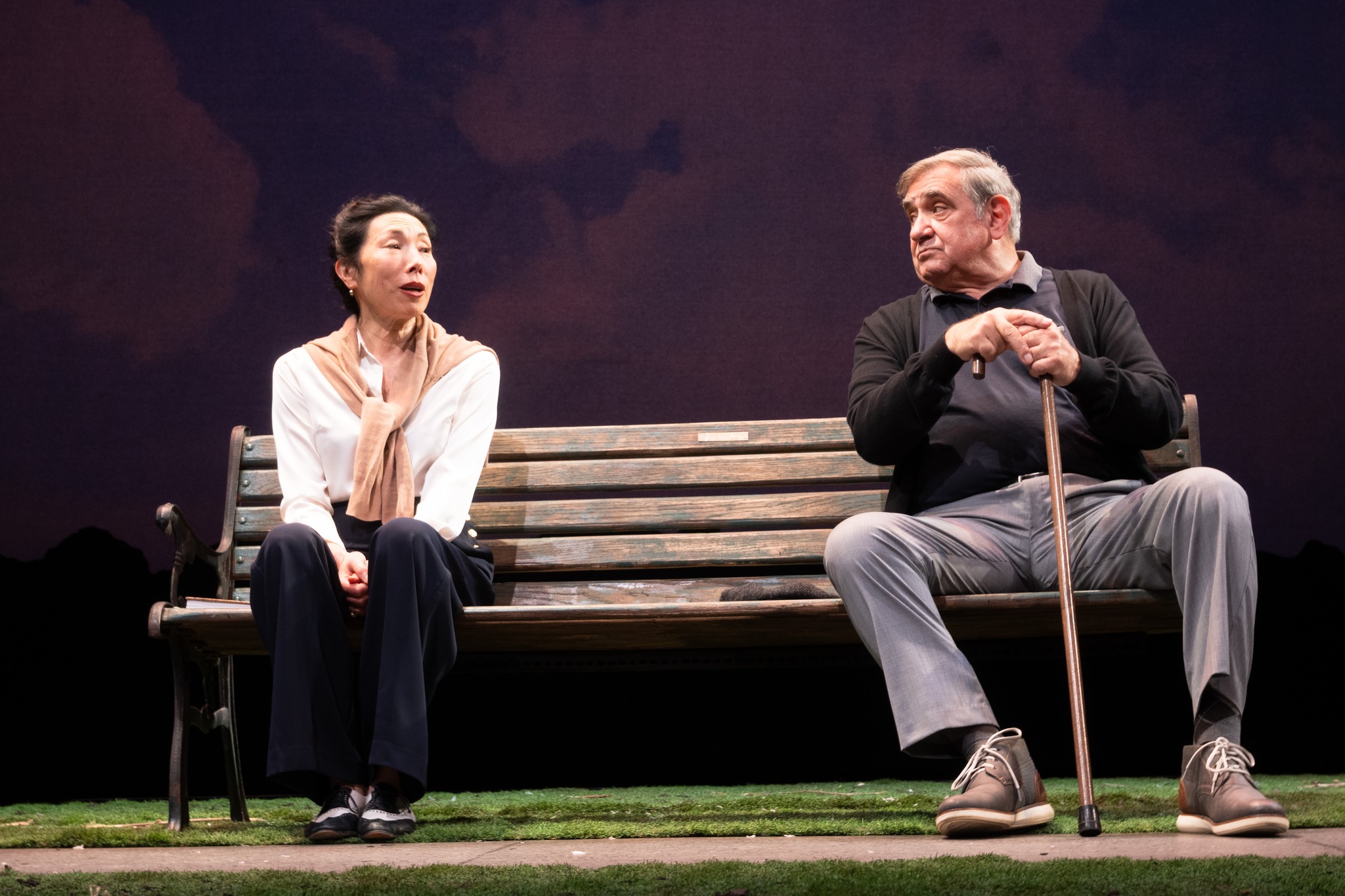
by Barbara Waldinger
Actors are hired for piecemeal work–one production at a time—unless they are fortunate enough to be part of a continuing series, as was Dan Lauria in The Wonder Years, among others.But even series come to an end and what’s next? Some actors turn to directing and others to playwriting. Lauria has done all three, two of which can be seen in Great Barrington Public Theater’s current production of Just Another Day, which he wrote and performs (with co-star Jodi Long).
Lauria considers himself “an actor who writes,” according to a recent article in the Times Union. With an extensive resume in television, film and theatre, he does not lack for work, so what drew him to write Just Another Day? In Katherine N. McCombs adaptation of conversations with the playwright, we learn that this very personal play is based on his relationship with an old friend, a fellow comedy writer, who is 94 and in memory care. But although this friend can’t remember much about his own life, he recalls everything about baseball: specifically the Yankees and Babe Ruth. Once the two connect through baseball, other memories emerge. In Just Another Day, Lauria substitutes classic movies for baseball, and a woman as the friend. The play is a co-production with Shadowland Stages in Ellenville, New York, where its World Premiere was directed by James Glossman this past June, with Patty McCormack playing the Woman.
What does Lauria add to the many television and film treatments of dementia? Perhaps because of his vast experience in comedy, this play prioritizes laughter. The Woman says “We must try to remember the laughter.” When all else is forgotten, that is what remains. In his search for connection with her, the Man seizes on their memories of movies they loved, encouraging her to join him in creating their own comic storyline and characters. He tells her: “as long as we create, we are not lost.” As writers, they can build their world with words, a gift that Lauria prizes: his play is about “words being lost and us forgetting. . .We’re losing language. We’re afraid of it. . . And I think the theater has to elevate it.” (Times Union)
Artistic Director Jim Frangione is committed to offering his audience the opportunity to see “new and emerging plays.” This process, involving constant revisions, helps to develop the work of upcoming playwrights. In future rewrites of Just Another Day there are several areas that might benefit from a second look. Because of the importance of language in the play, the Woman is an intellectual who adores the Sunday New York Times crossword puzzle, and uses long, complex, esoteric words in her speech. After a while, this proves to be a clumsy way of differentiating the two characters—Lauria’s character is Italian from Brooklyn, stereotypical in his language and sexual attitudes.

In addition, for much of the first act, the playwright insists on keeping us guessing as to where the characters are and what is happening. The lovely setting (by Christopher and Justin Swader, lit beautifully in the evening scenes by Matthew E. Adelson) is a park featuring a bench, a rock, a large waste basket and a lamp post with a circular backdrop of the sky and clouds. There is a bell, rung by an offstage person they claim to be a woman in white, every time the Man and Woman touch. The Woman, who at first wants to flee the bench where this uncouth “Neanderthal” is sitting, gets up, moves towards the exit, but never leaves the stage. Baffled audience members may be so busy figuring this all out that they miss the warmth and friendship that is developing onstage.
Once the play finds its center, which is the comedy within the tragedy of aging and memory loss, the audience can settle in and grow to love these characters, the dialogue, and, most of all, the performances of Lauria and Long. Long is a perfect foil for Lauria: her character speaks like a college English professor rather than a comedy writer, yet she is adept at comedy. She effortlessly and believably expresses the gamut of human emotions. For example, in the middle of a silly scene she can suddenly turn to the man and ask “Who Are You?” As her mental condition worsens, she can break your heart, wondering if he’ll be there the next day and if they will remember each other or anything that was said.
As a natural comedian, Lauria’s Man is most comfortable when he’s center stage, breaking the fourth wall, telling jokes to the audience. That this Man is capable of pulling the Woman out of the fog into which she’s sinking and retrieving the poet inside of her is miraculous and moving. Lauria does it very well by gently complimenting her beauty, her talent, by making her laugh and by assuring her of his love. He’ll be whoever she needs him to be—such gallantry, but for her: frustration, because she demands answers and he cannot give them.
Just Another Day is a play that gradually makes its way into our hearts. With some revisions, it can reach us a good deal sooner.
JUST ANOTHER DAY runs from August 3-13 at Daniel Arts Center’s McConnell Theater at Bard College at Simon’s Rock, 84 Alford Road, Great Barrington, MA., Thursday—Saturday, 7:30 pm; Saturday and Sunday, 3:00 pm. For tickets call 413-372-1980 online at GreatBarringtonPublicTheater.org. The show runs 1 hour 40 minutes including a 5 minute pause between the first and second acts.
Great Barrington Public Theater presents JUST ANOTHER DAY by Dan Lauria. Original Direction by James Glossman. Cast: Dan Lauria (Man), Jodi Long (Woman). Scenic Design: Christopher and Justin Swader; Lighting Design: Matthew E. Adelson; Sound Design: Jacob Fisch; Costume Design: George Veale; Production Stage Manager: Kaleigh Cerqua.

